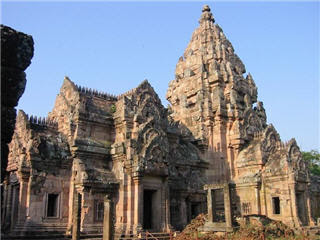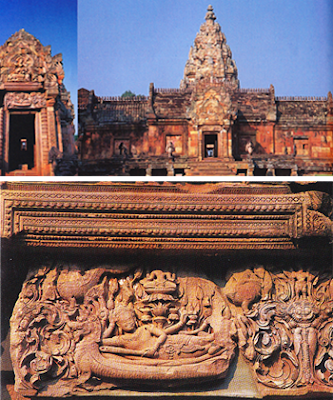The provincial seal shows the Phanom Rung sandstone castle, a Hindu shrine of the Shivaite sect. The monument was in use from the 9th till the 12th century when the Khmer Empire was overthrown from Ayutthaya. It is now a historic park.
The provincial flower is the Yellow Cotton Tree (Cochlospermum regium), and the provincial tree is the Pink Shower (Cassia grandis).
The provincial slogan is The city of sandstone sanctuaries, the land of volcanoes, beautiful silk and rich culture.
Almost a thousand years ago the present- day Buri Ram area was evidently subdued to Khmer Empire as many ruins from that time are still visible there. The biggest of them on an extinct volcano is protected in the Phanom Rung historical park. According to the inscription found, her ruler recognized the hegemony of Khmer Empire's king. Before the foundation of Bangkok, little was known about her. From early Bangkok Period, in the early nineteenth century, the town originally called Muang Pae, was renamed 'Buriram'. Then she became under Thai rule. After the administrative reform in the late nineteenth century, Buriram was incorporated into Siam or late Thailand as a province.
Buri Ram (Thai: บุรีรัมย์) is one of the north-eastern provinces (changwat) of Thailand. Neighboring provinces are (from south clockwise) Sa Kaeo, Nakhon Ratchasima, Khon Kaen, Maha Sarakham and Surin. To the south-east it borders Oddar Meancheay of Cambodia. The name Buri Ram means City of happiness.
skip to main |
skip to sidebar






ShareThis
Labels
- Africa Tourist Attractions (1)
- Amazing Thailand (7)
- Asia Tourist Attractions (54)
- Australia and Oceania Tourist Attractions (1)
- Build Tourist Attractions (26)
- cathedral and temples attractions (22)
- Europe Tourist Attractions (37)
- Historical attractions (2)
- Historic Building Attractions (24)
- Island tourist attractions (5)
- Most Amazing Caves (5)
- Natural Tourist Attractions (23)
- Nort America Tourist Attractions (16)
- South America Tourist Attractions (15)
- the history of civilization attractions (23)
- The most beautiful hotel in the world (10)
- The temple tourist attractions (10)
- the world's most livable city in the top 10 include (1)
- Top 10 most romantic location in the world (1)
- Top 10 places to visit in the world in 2011. (1)
- trave cambodia (2)
- travei laos (1)
- travel affarica (3)
- travel america (12)
- travel argentina (2)
- travel arstralia (1)
- travel asia (9)
- travel asian (13)
- travel brazil (3)
- travel cambodia (2)
- travel canada (5)
- travel chile (3)
- travel china (6)
- travel chinese (1)
- travel colombia (1)
- travel costarica (1)
- travel ecuador (1)
- travel egypt (3)
- travel england (5)
- travel falroe island (1)
- travel French (4)
- travel galapagos island (1)
- travel Galapagos Islands (1)
- travel germany (5)
- travel greenland (1)
- travel Hongkong (1)
- travel india (12)
- travel indonesia (1)
- travel italy (8)
- travel japan (2)
- travel jordan (2)
- travel korea (1)
- travel laos (1)
- travel malaysia (2)
- travel maldives (1)
- travel mexico (3)
- travel mongolia (1)
- travel myanmar (1)
- travel nepal (3)
- travel north america (2)
- travel norway (1)
- travel peru (4)
- travel poland (2)
- travel rome (1)
- travel russia (3)
- travel Slovenia (1)
- travel south affarica (1)
- travel spain (4)
- travel sri lanka (1)
- travel Switzerland (2)
- travel thailand (22)
- travel tibet (2)
- travel turkey (1)
- travel ukrain (1)
- travel urope (1)
- travel video (2)
Blogroll






About Me
Followers
Recommended
-
►
2015
(1)
- ► 02/22 - 03/01 (1)
-
►
2012
(7)
- ► 06/03 - 06/10 (1)
- ► 05/20 - 05/27 (1)
- ► 05/13 - 05/20 (2)
- ► 05/06 - 05/13 (1)
- ► 04/29 - 05/06 (2)
-
▼
2011
(158)
- ► 11/27 - 12/04 (2)
- ► 11/20 - 11/27 (1)
- ► 11/13 - 11/20 (1)
- ► 11/06 - 11/13 (2)
- ► 10/23 - 10/30 (2)
- ► 10/16 - 10/23 (3)
- ► 10/09 - 10/16 (3)
- ► 10/02 - 10/09 (5)
- ► 09/25 - 10/02 (3)
- ► 09/18 - 09/25 (4)
- ► 09/11 - 09/18 (5)
- ► 09/04 - 09/11 (5)
- ► 08/21 - 08/28 (4)
- ► 08/14 - 08/21 (5)
- ► 08/07 - 08/14 (18)
- ► 07/31 - 08/07 (3)
- ► 07/17 - 07/24 (27)
- ► 07/10 - 07/17 (3)
- ► 07/03 - 07/10 (11)
- ► 04/24 - 05/01 (23)
-
▼
04/17 - 04/24
(27)
- Borobudur or Barabudur
- the Angkor Wat temples
- Mount Fuji The Sleeping Volcano
- Mount Everest
- The Mystery of Stonehenge
- Saint Peters Basilica
- The CN Tower
- Chichen Itza And More
- Travel The Amazon River In Luxury
- Iguassu Falls
- The Galapagos Islands
- Leaning Tower of Pisa
- The Great Pyramid of Egypt
- Moai - The Easter Island Tiki
- Inca city , Machu Picchu
- Statue Cristo Redentor
- The Skywalk Grand Canyon
- Niagara Falls
- The Taj Mahal of Agra
- Colosseum of Rome
- The Eiffel Tower - The Symbol Of Paris
- Great Wall of China Tourist Attraction
- Si Satchanalai historical park
- Phanom Rung sandstone castle
- Phimai was an ancient Khmer city named Vimai or Vi...
- Sukhothai Historical Park
- Ayutthaya Historical Park
- ► 04/03 - 04/10 (1)
Recent Comments
Recent Post
Property for sale in France
Properties uploaded from agents, updated daily.Improve your marketing with the best web directories This site is listed under Finland Directory
Properties uploaded from agents, updated daily.Improve your marketing with the best web directories This site is listed under Finland Directory
Recent Entries
.
Popular Posts
-
Las Vegas' best outdoor activity? The Skywalk Grand Canyon , of course. For good reason, too: Where else in the world can you walk 70 fe...
-
Generations of inhabitants have lived in the mountains through out the world. They have learned and mastered the behaviors of these mountain...
-
Mount Fuji or Fujisan is Japan’s highest mountain. The peak lies at 3776 meters which translates to 12,388ft. Its conical form, often sno...
-
Mont Saint-Michel is a rocky tidal island and a commune in Normandy, France. It is located approximately one kilometre off the country...
-
The current report by The Tibet Autonomous Region tells in 2009, 720,237 domestic and foreign tourists visited Tibet between January and Ma...
-
Niagara Falls i s a group of large waterfalls that are located in the Niagara river on the eastern coast of the United States and Canada. Th...
-
The Eiffel Tower , named after the French engineer Alexandre Gustave Eiffel, is one of the most famous structures in the world. It is the mo...
-
Why not arrange your Brazil vacation package around a visit to the breathtaking Iguassu Falls. This incredible waterfall spans three count...
-
Barcelona, Catalonia and radiates charm mixed with Spanish passion. A popular destination in the city, Barcelona welcomes many tourists ...
-
The Sistine Chapel is not just about Michelangelo. It is a collection of art from the minds and hands of other Italian painters. The histo...
Blog List
Tag
- Africa Tourist Attractions
- Amazing Thailand
- Asia Tourist Attractions
- Australia and Oceania Tourist Attractions
- Build Tourist Attractions
- Europe Tourist Attractions
- Historic Building Attractions
- Historical attractions
- Island tourist attractions
- Most Amazing Caves
- Natural Tourist Attractions
- Nort America Tourist Attractions
- South America Tourist Attractions
- The most beautiful hotel in the world
- The temple tourist attractions
- Top 10 most romantic location in the world
- Top 10 places to visit in the world in 2011.
- cathedral and temples attractions
- the history of civilization attractions
- the world's most livable city in the top 10 include
Country
- trave cambodia
- travei laos
- travel French
- travel Galapagos Islands
- travel Hongkong
- travel Slovenia
- travel Switzerland
- travel affarica
- travel america
- travel argentina
- travel arstralia
- travel asia
- travel asian
- travel brazil
- travel cambodia
- travel canada
- travel chile
- travel china
- travel chinese
- travel colombia
- travel costarica
- travel ecuador
- travel egypt
- travel england
- travel falroe island
- travel galapagos island
- travel germany
- travel greenland
- travel india
- travel indonesia
- travel italy
- travel japan
- travel jordan
- travel korea
- travel laos
- travel malaysia
- travel maldives
- travel mexico
- travel mongolia
- travel myanmar
- travel nepal
- travel north america
- travel norway
- travel peru
- travel poland
- travel rome
- travel russia
- travel south affarica
- travel spain
- travel sri lanka
- travel thailand
- travel tibet
- travel turkey
- travel ukrain
- travel urope
- travel video
Copyright © 2012 travel happy land Design by Star Chicago Hotels Sponsored By web hosting, Austria trips and Let's Travel!



















